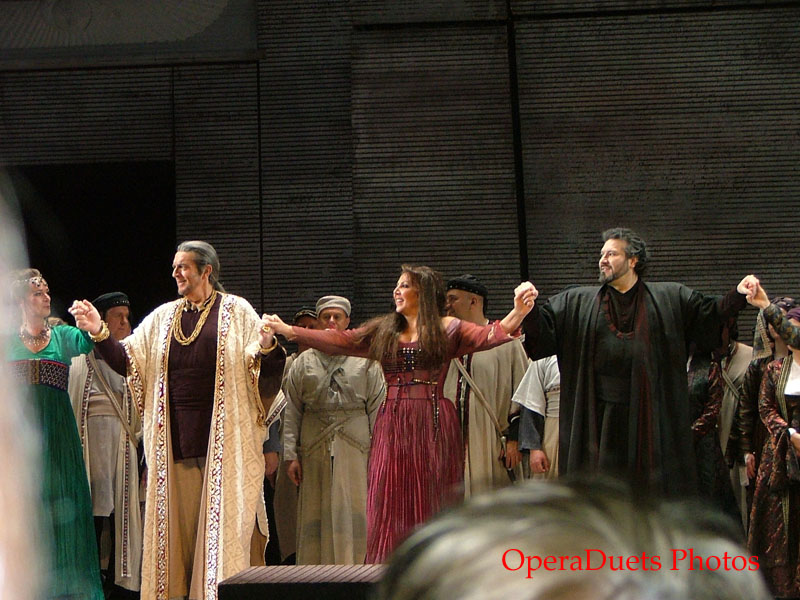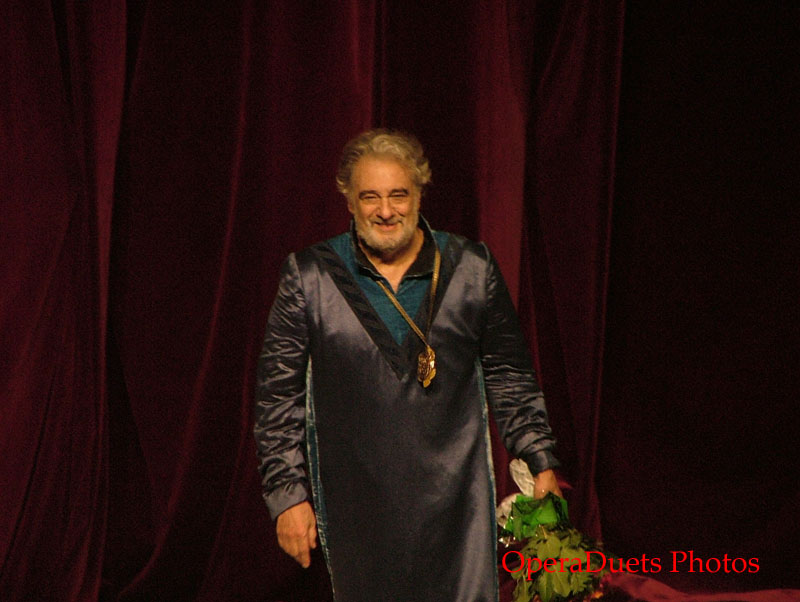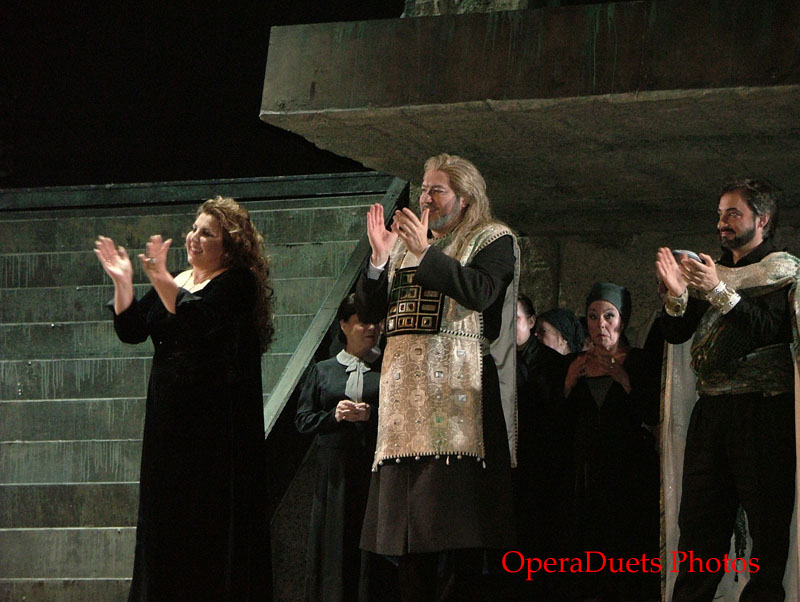2006-03-23 La Favorite (Donizetti), Opernhaus Zurich
Leonor de Guzman = Vesselina Kasarova
Fernand = Fabio Sartori
Inez = Jaël Azzaretti
Alphonse = Roberto Servile
Balthazar = Carlo Colombara
Don Gaspar = Eric Huchet
Marc Minkowski, conductor
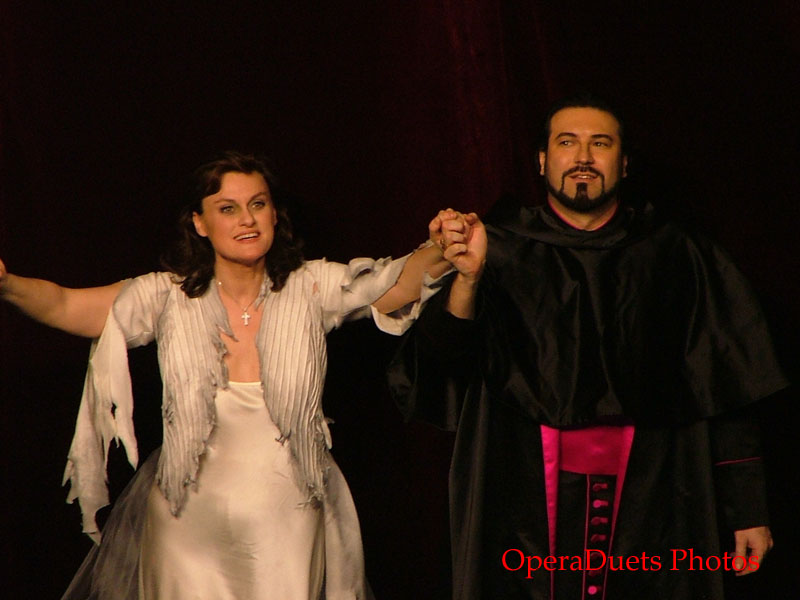
La Favorite - Donizetti
In französischer Sprache
Dirigent Marc Minkowski
Inszenierung Philippe Sireuil
Bühnenbild Vincent Lemaire
Kostüme Jorge Jara
Choreographie Avi Kaiser
Choreinstudierung Jürg Hämmerli
Lichtgestaltung Hans-Rudolf Kunz
First time that I saw Vesselina Kasarova live. And I liked the mezzo voice. Only wish it was La Favorita and not La Favorite. O mio Fernando would have been better than O mon Fernand. But today everybody likes to have the original. Well I think Favorita in Italian is better than Favorite in French. But will the operahouses nowadays dare to take the Italian Version that used to be more popular than the French (times has always been changing that). Nice voice, nice acting, nice woman, Kasarova. Unfortunately I found her voice not always as florid as I wished.
Jaël Azzaretti (Inez) was marvelous. Loved her singing. And Carlo Colombara (Balthazar) was as always wonderful, how I love his voice, deep and sonorous. Fabio Sartori (Fernand) has a good voice, beautiful and had he been slimmer then I would understand why Leonor fell for him. One was not always so aware of physical appearance when one listen to such a voice and he was also act, so he became Fernand. Roberto Servile (Alphonse) was not an ideal Alphonse, so unlike Carlos Alvarez in Vienna who I found very attractive as the King. Roberto Servile still had some great moments with Leonor but his thick and not so florid singing gave some rough moments.
The production: very nice scenography but unfortunately the team who created this Favorite had not believed this bel-canto opera good enough to stand on its own feet. La Favorite and the story here need not any more symbolism, just let it unfold. The director though he had good ideas, Fernand is only dreaming this etc. Just let us believe it, that the people and their feelings are real.
But worst of all the ballet, it was actually booed, not something that I believe happened frequently in Zurich. The King is throwing a party/ an entertainment for his mistress, the Favorite, Leonor. But the ballet is an insult to Leonor and an insult to the audience, do you really believe we are stupid, that we do not see the injustice to the women, the double morale. It was really such a disappointment to have that ballet moment done that way right in the middle of a fine opera evening. IT WAS JUST A VERY stupid IDEA.
It was the ballet alone that made a FIVE of even SIX star production become just a 3 star. Luckily the ballet did not end the opera, but it was life a knife in your heart that one. SENSELESS, stupid. Thank God, Carlo Colombara was singing in the last act, his aria was just really the best thing in the whole evening. What a voice!!!!
OD Travel + Photos
Friday, March 23, 2018
March 23, 2006: La Favorite in Zurich
Posted by
operaduets
at
Friday, March 23, 2018
0
comments
![]()
Labels: 03_March, 03-23, 2006, Carlo Colombara, Fabio Sartori, FAVORITA, GAETANO DONIZETTI, Opera, Roberto Servile, Switzerland, Vesselina Kasarova, Zurich
Wednesday, March 14, 2018
March 14, 2003: Don Carlo in Zurich
2003-03-14 Don Carlo (G. Verdi), Opernhaus Zurich
Filippo II = Carlo Colombara
Don Carlo = José Cura
Rodrigo = Franco Vassallo
Il Grande Inquisitore = Pavel Daniluk
Un Frate = Giuseppe Scorsin
Elisabeth de Valois = Elena Prokina
La Principessa d'Eboli = Luciana D'Intino
Tebaldo = Judith Schmid
La Contessa d'Aremberg = Susanne Merle
Il Conte di Lerma = Leonardo Silva
Voce dal cielo = Sen Guo
Pier Giorgio Morandi, conductor
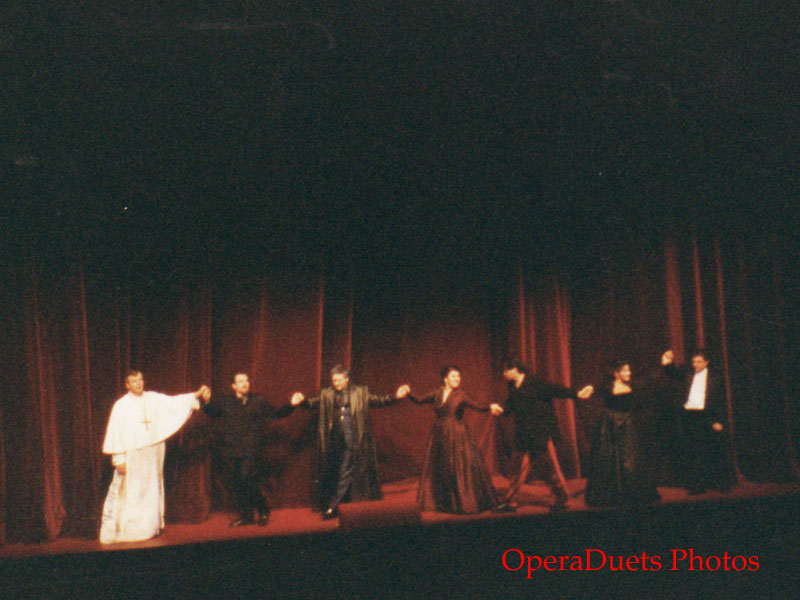
Verdi: Don Carlo
Musikalische LeitungPIER GIORGIO MORANDI
InszenierungWERNER DÜGGELlN
SpielleitungULRICH SENN
BühnenbildRAIMUND BAUER
KostümeSUE WILLMINGTON
LichtgestaltungJÜRGEN HOFFMANN
Chor ERNSTRAFFELSBERGER
Deputati fiamminghi/PETER KÁLMÁN, VALERIY MURGA,
Grandi di SpagnaSERGEY AKSENOVo, KEVIN ARMSTRONGo, MIRKO JANISKA
ERIC KELLERo, SEUNG-HYUK PARKo, FEDERICO SACCHlo
0 Mitglied des 105
CHOR DES OPERNHAUSES ZÜRICH
ZUSATZCHOR OPERNHAUS ZÜRICH
STATISTENVEREIN AM OPERNHAUS ZÜRICH
ORCHESTER DER OPER ZÜRICH
Solo-CelloLuciano Pezzani
Musikalische Assistenz
und EinstudierungTHOMAS BARTHEL, THOMAS GRABOWSKI
InspizienzPAUL SUTER
SouffleurLORENZO COLADONATO
Freitag, 14. März 2003FREITAG-ABO A
PAUSE NACH DEM ZWEITEN AKT BEGINN: 19.30 UHR
ENDE: ca. 23.00 UHR
Voce dal cielo
Sen Guo: In the autodafé-scene, her voice is heard at the end of this scene, when the heretics are burnt, tortured. A lovely voice promises the poor tortured souls that heaven is open for them. Beautifully sung by this Chinese soprano.
Il Conte di Lerma
Leonardo Silva: Good.
La Contessa d'Aremberg
Susanne Merle: She is the one that is expelled from the Spanish court for not being together with the Queen at the meeting of Elisabeth & Don Carlo. The King in this way offend also the Queen. The Queen comforts her compatriot, she is not expelled from the heart of the Queen ("Non pianger, mia compagna"). Silent role. Tall, blond woman, skinny. An actress, or a just a member of the chorus.
Tebaldo
Judith Schmid: a trouser role for this Swiss mezzo. Walking and acting very much like a young man, which is her role. In this Zurich version it is Tebaldo who announces people coming in, and not the Count of Lerma like in the Salzburg 1986-version.Very good voice and acting.
La Principessa d'Eboli
Luciana d'Intino: this Italian mezzo is today's great Eboli. Amneris and so on. Her dark voice have an agility for coloratura even though her voice is a big one. And she even acts...All opera singers are supposed to act, but still some really can't do that and sing at the same time, Luciana has no problem with that. Onstage never for a second, is she not Eboli. Her passion, witty and loves clearly portrayed by Luciana d'Intino. Her song of the veil is great, and she is great in duos, trios and quartets, and her O don fatale is stupendous.
Elisabetta di Valois (Elisabeth de Valois, Queen of Spain)
Elena Prokina: great singing and acting by this Russian soprano. She does well her big aria in the end of the opera, Tu che le vanita, even though she doesn't quite have the big voice to really get it right. She is the Queen of this opera, regal in presence, and still gets the human side of Elisabeth to stand out like a real human being. The confrontation with the King, as a King's daughter she has greatness and is not easily intimidated. She shines, she acts very well with all the other members in the ensemble.
Un frate (The imperator Carlo Quinto?, Charles V)
Giuseppe Scorsin: the 3rd bass in Don Carlo. In this production we don't see him, we only hear him and the other monks at the monastery San Juste, in the beginning and the end of the opera. Good.
Il Grande Inquisitore
Pavel Daniluk: the 2nd bass. I have to say he does OK, I wonder if he lacks some of the deepest notes when he sings SiRe, it doesn't seem to go easily down. Good.?
Rodrigo, Marchese di Posa
Franco Vassallo: A really great Rodrigo sung and acted by this Milanese baritone. In flesh and blood real, but still a dreamer. GREAT!!!
Don Carlo (Don Carlos, Infante of Spain)
José Cura: Bravo, Cura! I don't understand how you do that, managing to play so perfectly a Don Carlo closer to the historical truth than we usually see, and still not break against Verdi's Don Carlos. Magic... Hard work.
Filippo II (Philip II of Spain)
Carlo Colombara: the 1rst bass of Don Carlo. An unhappy father and spouse. He has a misfit as son and a wife who never loved him. Great singing an acting by this bass.
Pier Giorgio Morandi and the orchestra....
He did a good job, Morandi, but still something the orchestra drowned the singers.
BRAVI tutti
OD Travel + Photos
Posted by
operaduets
at
Wednesday, March 14, 2018
0
comments
![]()
Labels: 03_March, 03-14, 2003, Austria, Carlo Colombara, DON CARLO, Elena Prokina, Franco Vassallo, GIUSEPPE VERDI, José Cura, Luciana d'Intino, Opera, Switzerland, Zurich
Monday, March 12, 2018
March 12, 2003: Don Carlo in Zurich
2003-03-12 Don Carlo (G. Verdi), Opernhaus Zurich
Filippo II = Carlo Colombara
Don Carlo = José Cura
Rodrigo = Franco Vassallo
Il Grande Inquisitore = Pavel Daniluk
Un Frate = Giuseppe Scorsin
Elisabeth de Valois = Elena Prokina
La Principessa d'Eboli = Luciana D'Intino
Tebaldo = Judith Schmid
La Contessa d'Aremberg = Susanne Merle
Il Conte di Lerma = Leonardo Silva
Voce dal cielo = Sen Guo
Pier Giorgio Morandi, conductor
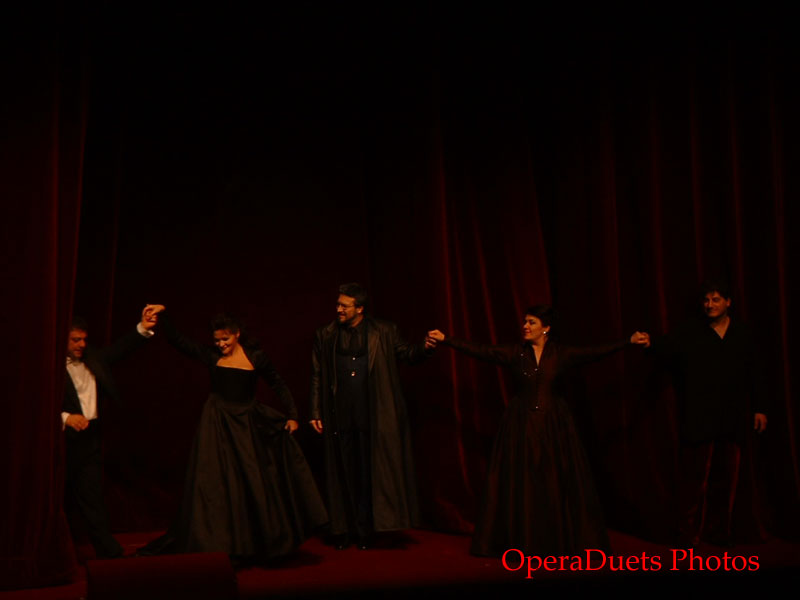
Verdi: Don Carlo
Regie Werner Düggelin
Musikalische Leituug PIER GIORGIO MORANDI
Inszenierung WERNER DÜGGELlN
Spielleitung ULRICH SENN
Bühnenbild RAIMUND BAUER
Kostüme SUE WILLMINGTON
Lichtgestaltung JÜRGEN HOFFMANN
Chor ERNST RAFFELSBERGER
Deputati fiamrninghi/PETER KÁLMÁN, VALERIY MURGA,
Grandi di Spagna SERGEY AKSENOVo, KEVIN ARMSTRONGo, MIRKO JANISKAo,
ERIC KELLERo, SEUNG-HYUK PARKo, FEDERICO SACCHr
0 Mitglied des 105
CHOR DES OPERNHAUSES ZÜRICH
ZUSATZCHOR OPERNHAUS ZÜRICH
STATISTENVEREIN AM OPERNHAUS ZÜRICH
ORCHESTER DER OPER ZÜRICH
Solo-Cello Luciano Pezzani
Musikalische Assistenz
und Einstudierung THOMAS BARTHEL, THOMAS GRABOWSKI
Inspizienz PAUL SUTER
Souffleur LORENZO COLADONATO
Mittwoch, 12. März 2003 FREIER VERKAUF
PAUSE NACH DEM ZWEITEN AKT BEGINN: 19.30 UHR
ENDE: ca. 23.00 UHR
Act 1 Scene 1
This is the Italian, 4 act version. Which starts in San Juste, with the monks singing "Carlo, o sommo Imperatore". The stage is black, and we do not see the monks, they are singing ofstage. Don Carlos is
already onstage, Jose Cura is laying down, making a pathetic figure, "Io l´ho perduta", he is mourning the loss of Elisabeth de Valois, his once-fiancee, who had to marry the King, Filip II, his own father for political reasons. Luckily the voice of Cura was improved after the first minutes here. Don Carlos´ friend, Rodrigo sees Don Carlo, the Infante of Spain in quite a mood. But Rodrigo makes Don Carlos think of the Flemish people in need, Jose Cura and Franco Vassallo sings a wonderful "Dio che nell'alma infondere", even though Cura is sometime of of synch, so the conductor Morandi must take special care and point to Cura, when he is on cue. When Filip II
and Elisabeth de Valois comes in to pray, they and the 6 "bodyguards" walks to fast for a royal prosession I think.
Act 1 Scene 2.
It is in bright blue, with some wonderful scenery, the court ladies is making a big picture of Fontainebleu, for the queen. Tebaldo is walking around like a teenager with an important job. Then Pricess Eboli arrives and soon a happy song of the veil, Muhammed and his queen. Eboli, Luciana d'Intino receives the first applause, she
is fantasic. Coloratura-alto. Then the queen arrives, Elena Prokina is Elisabeth de Valois. And the Rodrigo, Grande de Espana, comes with one secret message from Carlos, and one official from the royal Queen
mother in France. And soon a terzett "Che mai si fa nel suol francese", where Rodrigo efficiently and elegantly stops Eboli from casting the eyes at the Queen, finding something suspicious. And then Don Carlos comes to talk with his "mother" (step-mother, naturally), and Jose Cura starts very softly but is soon angered by Elisabeth de Valois "coldness", Elisabeth speaks of honnour and Carlos wants to talk about love. "Io vengo a domandar" ends with Elisabeth telling about murder his father, and marry his mother. "Maledetta io son",
and Carlos runs out. Then the King, Carlo Colombara, come in and see the queen alone, that is against the etiquette of the Spanish court. ONLY, that when the king arrives, the court woman have arrived a
little too soon... The Lady of Honnour who was supposed to be with the Queen, gets the message from the King, go back to France. So the queen looses her compatriot at the court, "Non pianger, mia compagna". Elena Prokina is a little out of synch and conductor and singer tries to get intact. Then all is leaving, but The king want to talk to Rodrigo". Great Duet ("Restate!")
Act 2 Scene 1
In the Queens Garden, Don Carlo (Jose Cura) is waiting for his beloved, Elisabeth de Valois to come for a secret rendez-vous. But it is naturally Princess Eboli (Luciana d'Intino) who comes. She thinks the Infante loves her, Eboli, but then realise that the sweet words was meant for somebody else, ... the Queen. A fantastic Duet that becomes a wonderful Trio, when Rodrigo (Franco Vassallo) comes in to save Don Carlo when the rage of a jilted woman. My favourite scene in this opera. Rodrigo makes Don Carlo give som letters about the revolt they are planning in Flandern, and some love letters.
Act 2 scene 2 Autodafe-scene.
Grand scene with all people gathered to have a feast, when "enjoying" the death of sinners condamned by the Spanish Inquisition. The King, Carlo Colombara, restates his vow to be the protector the Cathotic faith. "Gloria a Filippo, gloria al ciel'!" Then suddenly Don Carlo comes in with the Flemish deputation to ask of clemency for Flandern and Brabant, something the King and the Monks refused, but the people with Elisabeth and Rodrigo asks for clemency also. Don Carlo loses his patience, and ask of to reign Flandern and Brabante (Sire! egli e tempo ch'io viva), when the King refuses this, Don Carlo threaten his father with a sword. Only Rodrigo asks for the sword from the Infante. The crisis is over. And the celebration of death of the heretics can continue. A voice from Heaven, promises the "heretic" salvation.
Intermession
Act 3 Scene 1
In the chamber of the King Filip II, Carlo Colombara is singing the wonderful aria "Ella giammai m'amo". Elisabeth has never loved the King, and the Infante is rebelling against his father. Filip thinks that his crown makes it possible to read the mind of others, the king has a very suspicious mind. He long for peace, to sleep in Escorial, the royal grave. More misfortunes, the Grand-Inquisitor comes in, and two basses are battling against each-other, why must the crown always bend for the altar. Grand-Inquisitor gives the king permission, to excile or death to the Infante, but he wants the life of Rodrigo of Posa, The king tries to resist... And after this The queen comes asking for justice, someone has robbed her of the box inwhich all her juwellery is in. Filip has it, he opens it a finds the portrait of Don Carlo. He accuses Elisabeth of being an adulteress, she swoons, Rodrigo and Eboli rushes in. Wonderful quartett. It is Eboli who has stolen it, and told Filip about Elisabeth and Carlos. She asks for forgivesness, is almost forgiven but the she has more on her hart, the King has seduced Eboli, this can not be forgiven, Eboli gets the choice of excile or the convent. Then comes the BIG moment, "O don fatale", where Eboli mourns the loss of her queen, never to see her again, a curses her own beauty that have made her so vain. Then she remembers Don Carlo, he is condammed to death, One day I have left, I can save him.
(This is what I call a highlights-only scene)
Act 3 Scene 2
The prison of Don Carlos. Rodrigo comes to visit his friend. He has saved him, the letters have been found in Rodrigos room. "Per me giunto e il di supremo". And then when the bullet come, he tells Carlos that his "mother" knows everything, go to San Juste, she will meet you there, YOU can save Flandern. Rodrigos has just died, when Filip II comes to give his son the sword back. Don Carlos refuses, since The king has killed the best friend, he gave his life for me. The people wants the Infante, the Grand-Inquisitor comes to calm all down, prostrate to your King.
Act 4
San Juste. Elisabeth de Valois, Elena Prokina sing her Great Aria "Tur che la vanita", about Carlo V, Charles V. Then Cura and Prokina have their last duet. "E dessa! - Ma lassù ci vedremo in un mondo migliore". At last Don Carlo is ready to forget Elisabeth and to use all his force to the Flemish cause. But the the King and Grand-Inquisitor appear. They demand both deaths. And then the opera ends with the monk, and they all are afraid since they hear the voice of Carlo V, the grand-father of Don Carlos. In the confussion, Don Carlo and Elisabeth disappair into the monastery San Juste.
First time I know that Elisabeth was saved, too!!
GREAT OPERA
Bravi, tutti!
OD Travel + Photos
Posted by
operaduets
at
Monday, March 12, 2018
0
comments
![]()
Labels: 03_March, 03-12, 2003, Austria, Carlo Colombara, DON CARLO, Elena Prokina, Franco Vassallo, GIUSEPPE VERDI, José Cura, Luciana d'Intino, Opera, Switzerland, Zurich
Tuesday, January 30, 2018
January 30, 2010: Nabucco in Zurich
2010-01-30 Nabucco (Verdi), Opernhaus Zurich
Nabucco = Juan Pons
Ismaele = Boiko Zvetanov
Zaccaria = Carlo Colombara
Abigaille = Maria Guleghina
Fenena = Stefania Kaluza
High Priest of Belo = Cheyne Davidson
Abdallo = Miroslav Christoff
Anna = Liuba Chuchrova
Nello Santi, conductor
NABUCCO by Giuseppe Verdi. Maria Guleghina was a fantastic Abigaille. Juan Pons was suddenly much thinner but still made a great Nabucco. Boiko Zvetanov was looking like a small Dennis O'Neill. But he was great as Ismaele. One could easily forget his heavy and small look and understand why two women were in love with him. Stefania Kaluza was singing Fenena, she was great in the ensembles, duets, etc. but strangely did not make such a great impression in her aria. Chorus was great. Nello Santi conducted.
Obviously Jonathan Miller had been thinking too much about history. Would really the women and men be separated when they were about to be executed.
Inszenierung
Jonathan Miller
Ausstattung
Isabella Bywater
Lichtgestaltung
Hans-Rudolf Kunz
Choreinstudierung
Jürg Hämmerli
Orchester der Oper Zürich
Chor der Oper Zürich
OD Travel + Photos
OD Travel - January: Nabucco and travel from Zurich
For more reviews from my travels, see www.operaduetstravel.com If you want to see more photos from my OperaDuets Travels, go to www.operaduetsphotos.com
Posted by
operaduets
at
Tuesday, January 30, 2018
0
comments
![]()
Labels: 01_January, 01-30, 2010, Boiko Zvetanov, Carlo Colombara, GIUSEPPE VERDI, Juan Pons, Maria Guleghina, NABUCCO, Nello Santi, Opera, Stefania Kaluza, Switzerland, Zurich
Monday, July 3, 2017
July 3, 2012: Simon Boccanegra in Zurich
2012-07-03 Simon Boccanegra (Verdi), Opernhaus Zurich
Simon Boccanegra = Plácido Domingo
Maria Boccanegra (Amelia) = Barbara Frittoli
Jacopo Fiesco = Carlo Colombara
Gabriele Adorno = Fabio Sartori
Paolo Albiani = Cheyne Davidson
Pietro = Giuseppe Scorsin
Ein Hauptmann der Bogenschützen = Ilker Arcayürek
Eine Dienerin Amelias = Julie Bartholomew
Carlo Rizzi, conductor
Producer/production - Giancarlo del Monaco
Set design - Carlo Centolavigna
Costumes - Maria Filippi
Lighting - Hans-Rudolf Kunz
STANDING OVATION FOR PLACIDO DOMINGO IN ZURICH 2012-07-03
Placido Domingo as Simon Boccanegra. The tenor as baritone. The multi-talent Placido Domingo is loved by many but many think he is over-reaching himself. I found him wonderful as Simon Boccanegra but I must accept that had I only listened to him then I might have been more skeptical. The Magic of Placido Domingo was in his abilty not only to sing each note but to do so while acting. Placido Domingo was Simon Boccanegra that night in Zurich. Pure baritones may sing it more beautiful but in acting Placido is a gigant.
Cheyne Davidson sang Paolo Albiani in stead of earlier mentioned Massimo Cavalletti. Cheyne Davidson and Giuseppe Scorsin sanf Paolo and Pietro. Something made me feel that they were not quite up to par. Paolo lacked his bite and bile. Pietro was a deep-voiced but no depth. Luckily they are not that important except that done properly they do give some extra depth to the story. Otherwise it would just be a family drama and not a political drama.
Placido Domingo clad in brown in the Prologue and he looked just like an old photo of Placido as Otello. So young he was as he lept on stage. And it was with Placido Domingo the opera really started to energize. Next energy burst came with Carlo Colombara as Jacopo Fiesco. The great Italian bass owned the stage during his great aria. Then two gigants Fiesco and Boccanegra, Colombara and Domingo, and wow, what an amazing duet. A duel between the fury of Fiesco and the compassion of Boccanegra.
Act 1 and finally Barbara Frittoli as Amelia. She was stunning. Her voice and acting was amazing. I found her jsut perfect as Amelia. Beauty and style in every ounce. Fabio Sartori was her lover Gabriele Adorno. (This tenor is not a thin man but for once the costume people had chosen cloths that looks good on the not-so-thin people. I hope this is a trend that one will create costumes that looks good on all body-types. But I fear this is knowledge that is forgotten, REVIVE IT PLEASE.) Fabio Sartori has a wonderful tenor voice and was an amazing Adorno.
And what to say more. Act 2 and 3 was wonderful. The sets are beautil and the costumes too. It is a stilistic Genoa we see with the blue sea in the background. During the duet between Boccanegra and Amelia I cried and the end made me cry too. I am sure was weepy during other times of the opera. For me it meant that this SIMON BOCCANEGRA was great. It touched me. Placido Domingo touched me.
BRAVI, tutti!! BRAVO, Placido!!!
For more reviews from my travels, see www.operaduetstravel.com If you want to see more photos from my OperaDuets Travels, go to www.operaduetsphotos.com
Posted by
operaduets
at
Monday, July 03, 2017
0
comments
![]()
Labels: 07_July, 2012, Barbara Frittoli, Carlo Colombara, Fabio Sartori, GIUSEPPE VERDI, Opera, Placido Domingo, SIMON BOCCANEGRA, Switzerland, Zurich
Thursday, June 29, 2017
June 29, 2007: Nabucco in Verona
2007-06-29 Nabucco (Verdi), Arena di Verona
Nabucco = Leo Nucci
Ismaele = Fabio Sartori
Zaccaria = Carlo Colombara
Abigaille = Maria Guleghina
Fenena = Nino Surguladze
High Priest of Belo = Carlo Striuli
Abdallo = Carlo Bosi
Anna = Patrizia Cigna
Daniel Oren, conductor
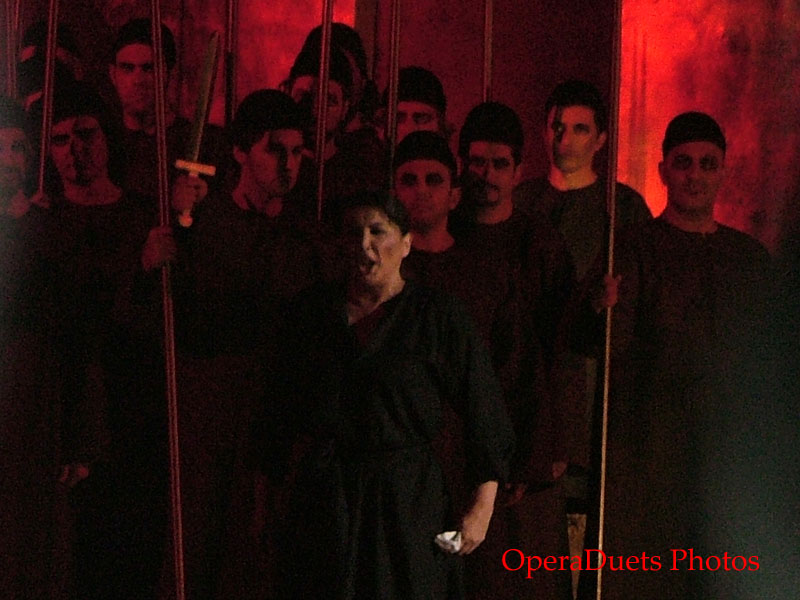
Nabucco
Dramma lirico in 4 acts by
Giuseppe Verdi
Libretto by Temistocle Solera
opera and synopsis
Arena
29 June 2007 at 21.15
Season Tickets
Principal Conductor Daniel Oren
Director Denis Krief
Scenographer Denis Krief
Costume Designer Denis Krief
Choir Master Marco Faelli
Director of the Corps de Ballet Maria Grazia Garofoli
Lighting Designer Paolo Mazzon
Director of stage design Giuseppe De Filippi Venezia
Orchestra, Chorus and technicians
from the Arena di Verona
Now Nabucco. Not the same production as two years ago. Leo Nucci was also then Nabucco and Susan Neves was Abigaille. Disappointment, two-fold; the production in 2005 was better, and my seat was better: I could hear better then, and no-one was talking during the show. Having read some review of the production with their pointing out disappointment towards Carlo Colombara and Maria Guleghina, they loved Leo Nucci, of course... so I knew something. And it was announced at the loud-speaker, that Colombara although slightly ill he was still singing. And you could tell he was not in top form but he was steadily better. Maria Guleghina was also weak sounding, but I think that was because of my seat. Had I been sitting in Poltronissimo God section and not (just) poltronissimo then I think my feeling had been better about this production, but I would still have found the ballet thing stupid and wondering why did they put such a boring costume on the wonderful soprano, Maria Guleghina. Fenena and Anna got something beautiful to wear. White for Fenena, red for Anna, but for Abigaille, dark earth colors.
And then singers did not come out where I was standing.
Must have more Maria Guleghina live. Especially as Abigaille....
OD Travel + Photos
Original blog post
Posted by
operaduets
at
Thursday, June 29, 2017
0
comments
![]()
Labels: 06_June, 2007, Carlo Colombara, Fabio Sartori, GIUSEPPE VERDI, Italy, Leo Nucci, Maria Guleghina, NABUCCO, Opera, Verona, Vienna
Friday, June 23, 2017
June 23, 2005: Aida in Verona
2005-06-23 Aida (Verdi), Arena di Verona
The King = Marco Spotti
Amneris = Tichina Vaughn
Aida = Micaela Carosi
Radamès = José Cura
Ramfis = Carlo Colombara
Amonasro = Alberto Mastromarino
A messenger = Carlo Bosi
High Priestess = Antonella Trevisan
Daniel Oren, conductor
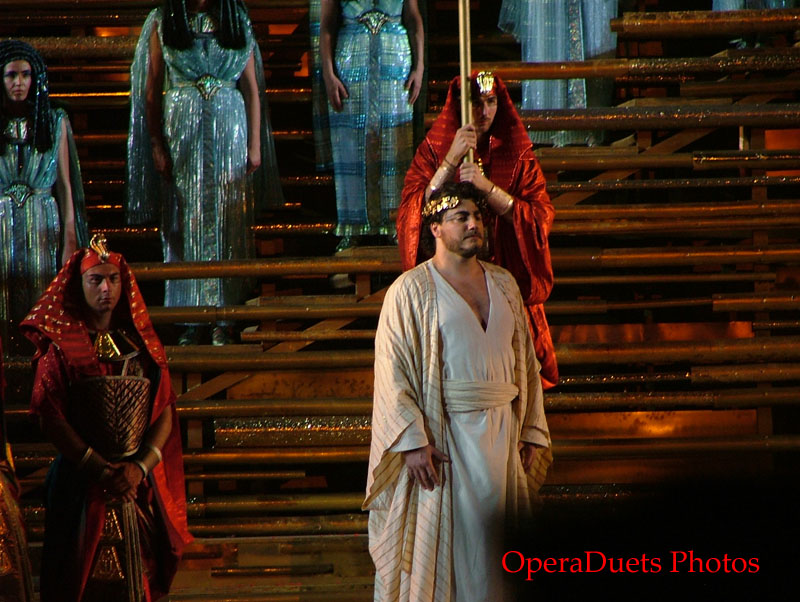
Arena
23 June 2005 - 21.15
Aida
Opera in 4 acts by Giuseppe Verdi
Libretto by Antonio Ghislanzoni
PRINCIPAL CONDUCTOR Daniel Oren
DIRECTOR Franco Zeffirelli
SCENOGRAPHER Franco Zeffirelli
COSTUME DESIGNER Anna Anni
I arrived in Verona Porta Nuova at 1500. It was a hot day. After staying in my hotel Tryp Verona for a few hours I took the Opera Bus to Verona (1830). I tried to find if I could see any JCx friends there, and then I sat at Cafe Opera and had some dinner before the opera. It seem to take forever until day at last opened door one, some trouble with the keys I think.
But at last at the Arena I met Yvonne and Kira and many more. This was a big Zeffirelli Aida production, beautiful and wonderfully operatic. I think I must have had some troubles with my ears because I didn't hear so well the first act. The conductor was a disappointment he was too fast in many of the delicate moments almost ruining the opera. Jose Cura looked wonderful and sing/acted Radames wonderfully. Tichina Vaughn did her best but lacked some of the charisma this role needs. Micaela Carosi had no such troubles, her voice was clear and she had a lot of charisma. No wonder the opera is called AIDA. Alberto Mastromarino was an efficient Amonasro, Carlo Colombara did well as Ramfis, Marco Spotti was OK as the King.
The Ballet was not to my liking, I found it almost offensive. The prima ballerina as a kind of high priestess was a good idea that worked very well.
OD Travel + Photos
Posted by
operaduets
at
Friday, June 23, 2017
0
comments
![]()
Labels: 06_June, 2005, AIDA, Carlo Colombara, GIUSEPPE VERDI, Italy, José Cura, Micaela Carosi, Opera, Tichina Vaughn, Verona
Friday, June 16, 2017
June 16, 2002: Aida in Munich
2002-06-16 Aida (G. Verdi), Bayerische Staatsoper (Munich)
Aida = Norma Fantini
Radames = Dennis O'Neill
Amneris = Nadja Michael
Ramfis = Carlo Colombara
Amonasro = Alexandru Agache
Re d'Egitto = Gerhard Auer
Un messagero = Francesco Petrozzi
Sacerdotessa = Annegeer Stumphius
Zubin Mehta, conductor
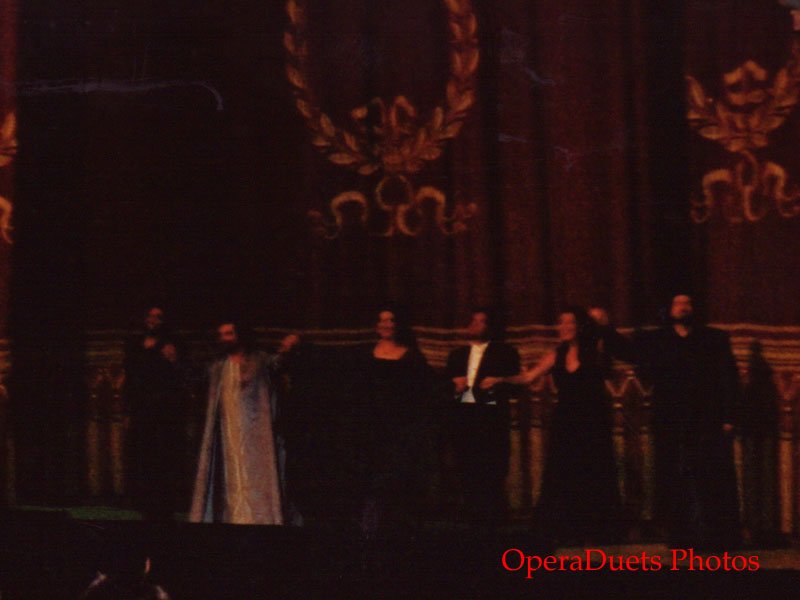
Bayerische Staatsoper
Staatsintendant Sir Peter Jonas
Generalmusikdirektor Zubin Mehta
Sonntag, 16 Juni 2002
5" Abonnement Serie 26
Aida
In italienischer Sprache mit deutschen Übertiteln
Oper in vier Akten
Libretto von Antonio Ghislanzoni
Musik von
Giuseppe Verdi
Musikalische Leitung" Zubin Mehta
Inszenierung David Pountney
Bühne" Robert Israel
Kostüme Dunya Ramicova
Choreographie' Nils Christe
Licht' Mimi Jordan Sherin
.Chöre" Udo Mehrpohl
Tänzer:
Aida'
Ein MannChristian lanole
Eine FrauValentina Divina
Amneris'
Zwei FrauenSaskia van Bosch, Chantal Gagnebin
Radames'
Zwei MännerVincent Loermans, Marc Mondelaers
Das Bayerische Staatsorchester
Der Chor und Extrachor der Bayerischen Staatsoper
Mitglieder des Bayerischen Staatsballetts (Ballettdirektor Ivan Liska)
Musikalische Assistenz' Massimiliano Murrali
Abendspielleitung: Markus Koch
Bühnenmusik: Gregor Raquet
Inspizienz' Nikolaus Ehlers, Holger Haase, Ruth Wieman
Souffleuse' Carmen Sylva Schileru
Lichtinspizienz' Hilde Harrer
Übertitel' Ingrid Zellner
Übertitel-lnspizienL Antonia Walther
Anfertigung der Bühnenausstattung und Kostüme in eigenen Werkstätten
@ G, Ricordi & Co" Mailand
Die Bayerische Staatsoper dankt Elfriede und Andreas Zäch und den Freunden des Nationaltheaters tür die großzügige Unterstützung der" Aida"-Produktion.
Nationaltheater München
Beginn 19.00 Uhr
Pause nach dem 2. Akt, ca. 30 Min. Ende ca. 22.10 Uhr
Zubin Mehta conducts. When the curtains go up, I see the scenography, and my heart sinks to the bottom, but Zubin is conducting, and the singers are excellent. They are all excellent. NADJA MICHAEL is a magnificent AMNERIS. What a great voice! Her slender body and big voice and a great actress too. NORMA FANTINI must be one of the best
AIDA's today, big voice. RAMFIS is also the best voice I have heard for long. Alexandru Agache is naturally a great baritone, but his pronunciation is not as clear as could have wished for. Dennis O´Neill is good as RADAMES, he looks like Pavarotti, but I still am not quite a fan of this Welsh tenor. Act 1 + 2 were together as one act, then 30 minutes pause, and then Act 3+4 together as one act. Luckily the
second half was much more to my liking as scenography. And wow, was there a great mezzo there in Nadja Michael, like in the duet with Radames in the fourth act, I have never heard it sung better. It was such a great performance, that even though it seem to ordinary to walk from the performance at minimum applause, people stayed on and
on. I was naturally one of the last to go.
Another 6 stars, the scenography gets only 3, 0 for act 1+2, 6 for act 3+4.
OD Travel + Photos
Posted by
operaduets
at
Friday, June 16, 2017
0
comments
![]()
Labels: 06_June, 2002, AIDA, Alexandru Agache, Carlo Colombara, Dennis O'Neill, Germany, GIUSEPPE VERDI, Munich, Nadja Michael, Norma Fantini, Opera
Sunday, May 28, 2017
May 28, 2012: Nabucco in Bilbao
2012-05-28 Nabucco (Verdi), Palacio Euskalduna (Bilbao)
Nabucco = Roberto Frontali
Ismaele = Alejandro Roy
Zaccaria = Carlo Colombara
Abigaille = Maria Guleghina
Fenena = Rosanna Rinaldi
High Priest of Belo = Silverio De la O
Abdallo = Eduardo Ituarte
Anna = Ana Otxoa
Massimo Zanetti, conductor
Orquesta del Teatro Regio di Parma
Coro de Ópera de Bilbao
Director de escena - Daniele Abbado
Scenography - Luigi Perego
Light design - Valerio Alfieri
It was the best Nabucco production with the best singers. Only one thing stood out for me as problematic and that was the golden hair of Zaccaria. Golden hair in the Middle East what was that about? Carlo Colombara has dark hair and could have been more authentic as Zaccaria without fake hair. This production of Nabucco was one that seemed to be about authenticity as history goes. Ismaele is clearly marked by his cloths as a Prince of Judea. Zaccaria is also similarly marked an important person. There is no doubt that Nabucco is an Assyrian King. All clearly marked except that one is never shown the chorus in Assyrian cloths. They are always dressed in Jewish cloths. This can be explained by the fact that Jerusalem is taken by Assyrians pretending to be Jews. But that is just true in the first act.
This is a beautiful production, intelligent and wants to be truthful to the libretto. Roberto Frontali, who I have seen as Stankar in the ROH Stiffelio production, was a truly fine Nabucco. Alejandro Joy was wonderful as Ismaele. Strong singing, wonderful acting. Rosanna Rinaldi was also great as Fenena. But the star was Maria Guleghina as Abigaille.
Abigaille can be boring since she is sometime acted as just a one-dimensional villain. Maria Guleghina shows all the different emotions that is Abigaille. She is weak sometimes. In this production one sees Abigaille hesitate in some crucial moment. How ambitious is she? She vacillate between power and love. Most of all she wants to be accepted as Nabucco's daughter and to be loved by Ismaele. Her feelings for her sister Fenena is also torn. Love and envy. So Nabucco changes into a believer of the God of Judea. As Abigaille loses her life she is also going to her redemption and I personally believe more in Abigaille change. Nabucco is just about his daughter Fenena.
I love Abigaille! And Maria Guleghina as Abigaille is just amazing!!!!!!!!!!!!!!!!!!!!!
OD Travel + Photos
Original blog post
For more reviews from my travels, see www.operaduetstravel.com If you want to see more photos from my OperaDuets Travels, go to www.operaduetsphotos.com
Posted by
operaduets
at
Sunday, May 28, 2017
0
comments
![]()
Labels: 05_May, 2012, Alejandro Roy, Bilbao, Carlo Colombara, GIUSEPPE VERDI, Maria Guleghina, NABUCCO, Opera, Roberto Frontali, Rossana Rinaldi, Spain
